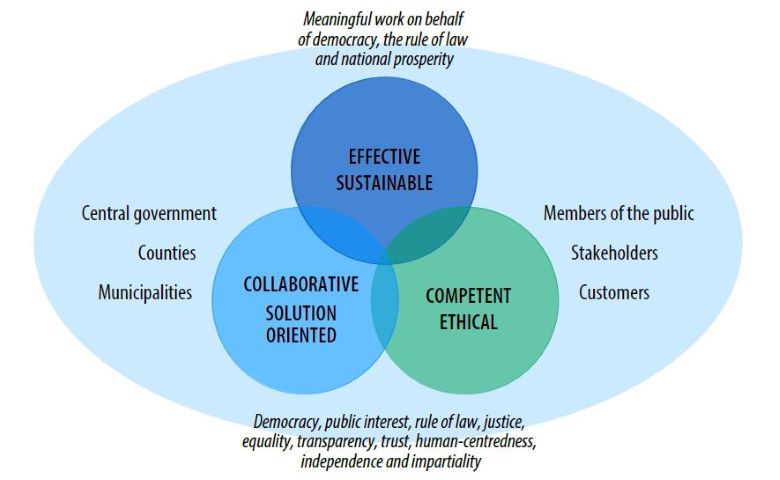Shared values and principles for public service leadership
The solid value base of public service leadership helps secure sustainable societal development. Mutual trust and a shared understanding of the key values and principles of public service leadership are needed if public administration is to function as a whole for the benefit of all of Finland and its people. This requires a shared understanding of the identity of public service leadership. Such a shared understanding strengthens democracy, the rule of law and the welfare society.
Ideally, values define how leaders carry the responsibility of their positions. Priorities may vary in different organisations and at different times, but the foundation remains the same. Different organisations can use a shared foundation of values to define more specific values that support their own activities. The key values in this shared foundation include:
- democracy
- public interest
- rule of law
- justice
- equality
- transparency
- trust
- a human-centred approach
- independence and
- impartiality.
A shared foundation of values is not enough in public administration. More detailed and organisation-specific ethical codes and leadership principles are also needed. The purpose of such codes and principles is to provide practical guidance for leadership and the development of leadership. The Public Service Leadership Group proposes the following principles for public administration (see the figure at the bottom of the page).
Diversity and specific features of leadership in public administration
There are major differences between the various branches of public administration. Public administration performs a wide range of duties, and different organisations have very different functions, structures and practices. The scope and diversity of public service leadership are being further increased by the continually evolving relationship between the expectations of members of the public and the structures and institutions of society.
The diversity of the operating environment is reflected in the scope of duties, the nature and complexity of societal phenomena, and the large number of stakeholders: members of the public, service users, political decision-makers, personnel, the media and other stakeholders. Public service leaders also have more roles than business leaders, for example.
Leadership in public administration and in the rest of society involves broadly similar basic issues, elements, management processes and practices. Effective interaction between public organisations, businesses and the third sector requires mutual understanding and trust. Interaction promotes the learning of good management models and practices, as well as good general management, for example, of people and services for members of the public and customers. However, public service leadership has specific features that differentiate it to a degree from leadership in general. These include:
- the multidimensional nature of leadership and the complexity of the operating environment;
- action on behalf of the public interest;
- the use of public powers of coercion;
- legislation and the protection of citizens under the law;
- the use of budgetary power and tax revenue;
- political guidance and decision-making;
- openness and transparency;
- democracy and citizen participation; and
- the universal nature of public services.
Public service leadership also involves the relationship between political decision-making and senior public officials. Political leadership in public administration by nature operates on different assumptions than management by public officials or professional management. Decisions by political leaders are influenced by political evaluations and objectives. Senior public officials prepare and implement these decisions using their expertise and are liable for acts in office. It falls on the most senior public officials in particular to reconcile political guidance with the demands of administrative customers. These demands also guide the objectives and activities of public services. Political leaders answer to voters in elections, while senior public officials answer to political decision-makers and, with respect to implementation, to administrative customers. The role of senior public officials also encompasses responsibility for the continuity of administration and for anticipating the needs of future generations beyond terms of political office. Changes in political leadership necessitate a clear division of duties and impartiality and independence on the part of senior public officials.
Duties and requirements of a public service leader
Public service leadership means doing meaningful and responsible work that serves the well-being of the whole society and democracy. Leaders are expected to understand society and societal phenomena, manage matters holistically, have social skills and use goal-oriented and facilitating approaches to work. Good public service leaders take responsibility for their entire organisation. This means simultaneously being responsible for the organisation's performance, its people, the sustainability of its governance and its development. A leader is able to navigate conflicting demands, which are part of the nature of leadership positions. For example, a leader is able to ensure the continuity of functions while simultaneously developing them. Succeeding in this task is made easier by a solution-oriented approach, which is a key feature of public service leadership in Finland. The work of a leader in public administration requires management skills and knowledge of substantive issues. The balance between these two can vary a great deal in different organisations and leadership positions.
By committing to shared values and leadership principles, senior public officials strengthen the ability of administration to function and bolster trust in society. Their task is to serve as personal examples and to ensure that values such as trust are realised within administration and in relations between administration and the public and partners. Foundations for ethical leadership are created by the leaders' own wellbeing, ability to manage their life and willingness to grow as leaders. Above all, good public service leaders are leaders of people that look after the wellbeing of their personnel and their own wellbeing. Public employers are responsible for systematically helping leaders grow into and succeed in their positions and for supporting their wellbeing. Good relations with personnel, colleagues and stakeholders also support growth and success. The overall demands on leaders must be balanced and on a human scale.



